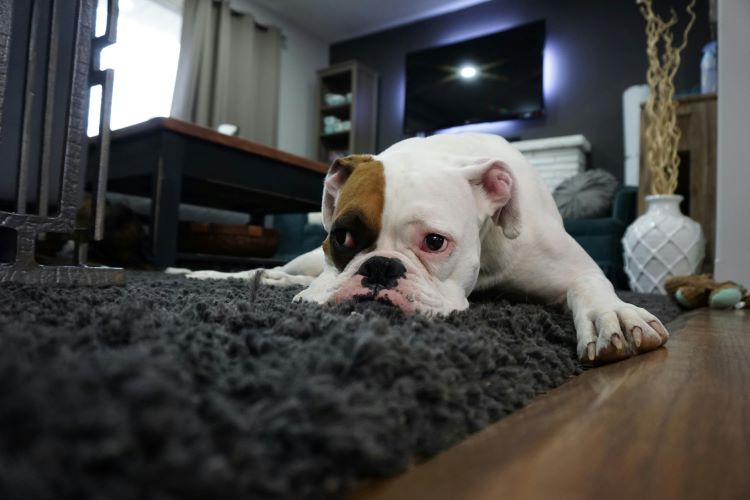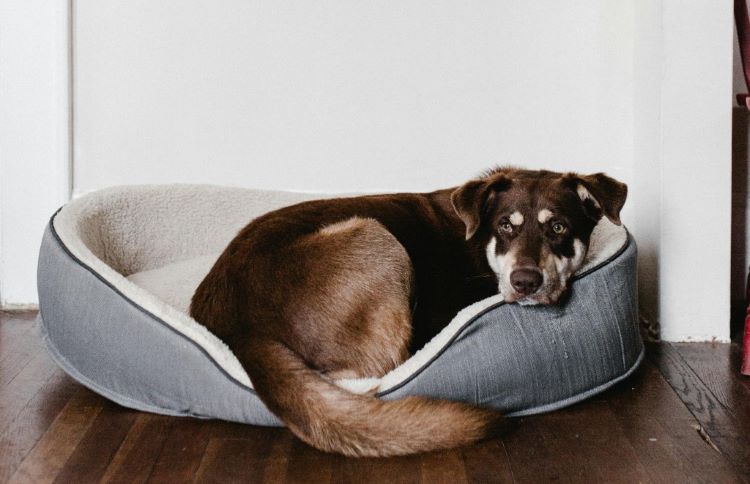Ready to help treat your pet to a healthy life?
Is Pepto-Bismol safe for dogs?
By : Trupanion Staff | Updated Nov 8, 2024

When you're feeling sick, you might head to the medicine cabinet and pull out the pink stuff. After all, Pepto-Bismol — and its generic version, bismuth subsalicylate — can work wonders on humans for the occasional nausea, heartburn, indigestion, upset stomach, and diarrhea. So, what about when your pet is suffering from the same symptoms? The over-the-counter (OTC) product is sold in pharmacies and grocery stores. It is easy to get and is considered widely safe for human consumption. As a result, many pet owners may consider giving it to their dogs, who, after all, also get upset stomachs and diarrhea. But is Pepto-Bismol safe for dogs?
The short answer is yes, it is technically safe for canine consumption. But as you may have guessed, there are some very important safety precautions you'll need to follow. Check with your vet, and read this first before you grab the pink stuff for your pup.
If your dog is currently vomiting, suffering from diarrhea, or displaying other alarming signs of gastrointestinal illness, call your veterinarian right away.
What is Pepto Bismol anyway?
Pepto-Bismol is perhaps the most recognized brand name of bismuth subsalicylate, also found under the names Pepti-Calm, BisBacter, and the generic name pink bismuth. It's all the same smooth and chalky pink stuff, but do you know what's actually in it? Pepto-Bismol is an oral medication used to treat gastrointestinal signs in humans, available in caplets, liquicaps, and liquid formulations. All of these have anti-inflammatory properties and can help calm the digestive tract.
Regardless of how it's taken or which brand name it's under, the action is the same. The active ingredient is bismuth subsalicylate, which is a derivative of salicylic acid, or aspirin. Once in the stomach (human or canine), bismuth subsalicylate is broken down into bismuth oxychloride and salicylic acid. The salicylic acid goes on to get absorbed into the blood stream through the small intestine, eventually cleared out by the body. The bismuth oxychloride meanwhile has a more exciting path: it produces what's called "bismuth salts," which have more long-term benefits. These salts bind to and inhibit the growth of bacteria along the gastrointestinal tract, helping to heal ulcers and remove sickness-causing bacterium.

How to give Pepto Bismol to your dog
Pink bismuth and all its brand variants are considered safe for dogs in very small quantities and only under veterinary direction. Because of this, it can't be stressed enough that you should consult with your veterinarian first before trying it.
Since most dogs have difficulty taking pills (and they can be a choking hazard), the liquid form of pepto is usually the best route. How you give it to your pup may depend on their feeding preferences and abilities. Some dogs may be fine licking it off a spoon. while others will do better drinking it from a bowl or plate. Your veterinarian may also recommend mixing a small amount of Pepto-Bismol in with some water.
What is the safe dose for dogs?
This is something that's always wise to ask your vet. The general rule of thumb is to not exceed 1 tsp per every 4.5 kg of body weight. However, because dogs come in all shapes and sizes, you'll want to check with in with the professional who knows your dog.
Remember that Pepto-Bismol can be used in dogs, but it does not suit every dog, and chronic use is not recommended. If your dog has gastrointestinal symptoms and you’re considering using Pepto-Bismol, consult your veterinarian first. Only administer the medication (or any medication for that matter) to your dog under their direction. We know we keep saying this, but that's because it's so important!
Side effects to be aware of
Pepto-Bismol may curb upset stomach and diarrhea, but as will all medications, negative side effects can potentially occur in dogs. Despite Pepto-Bismol being generally safe for dogs in small doses, it should not be considered totally safe. And if your veterinarian does not advise it, consider it off-limits for your pup.
Side effects can vary from pet to pet. They are more likely to occur when higher doses are given to your dog. If you notice any of the following, seek emergency veterinary care right away:
- Bloody vomit
- Increased diarrhea
- Acting in pain (abdominal pain may occur)
- Weakness
- Increased respiratory rate
- Dehydration
- Seizure
- Passing out
Bismuth subsalicylate, Pepto-Bismol’s active ingredient, can turn your pet’s stool black, which is problematic because it mimics melena (i.e., “digested” blood in the stool). Pets given Pepto-Bismol are already suffering from gastrointestinal signs, so it is important their medical team knows whether the change in stool color is due to a disease progression or a medication side effect.
Pepto-Bismol breaks down in your pet’s stomach into different components, including salicylic acid, or aspirin, which can be toxic to dogs in high doses. This is why you should never exceed the amounts advised by your veterinarian.
Other safety considerations
In addition to side effects from the Pepto Bismol itself, there are some other things you'll have to consider to keep your dog safe.
1. Avoid with other medications
Do not give Pepto-Bismol to pets currently taking other nonsteroidal anti-inflammatory medications for chronic conditions, such as Rimadyl or Deramaxx for arthritis. They are already at increased risk of stomach ulcerations or perforation. If your dog is on any other current medications, ask your veterinarian before adding pepto into the mix (even if you've given it to them before). Likewise, do not give your pet multiple medications for gastrointestinal upset at once.
2. Pepto-Bismol and X-rays don't mix
Pepto-Bismol tablets are radio-opaque, meaning they show up as dense objects on your pet’s abdominal X-rays. When your veterinarian investigates gastrointestinal signs, they look for gastrointestinal foreign bodies.
Dogs sometimes eat a variety of strange objects, apart from foods such as corn cobs. If your veterinarian sees that your pet, who is exhibiting gastrointestinal signs such as vomiting or diarrhea, also has opaque objects in her stomach or intestines, they may suspect that a foreign object is causing a blockage or leaking caustic chemicals.
A foreign intestinal body typically warrants invasive surgery, and a Pepto-Bismol tablet can look like a dangerous foreign object, leading to unwarranted surgical removal. Owners must always tell their veterinarian if they have given or plan to give a pet Pepto-Bismol.
3. It might not taste good to your dog
Along with the obvious safety concerns, it's worth considering that your dog also might not like the taste of Pepto-Bismol. Though they're often considered food machines who'll eat just about anything, many dogs do have taste and texture preferences. If your dog is spitting the pink bismuth out, don't force it on them. Doing so could cause unnecessary stress and make their gastrointestinal symptoms even worse!

Alternatives to Pepto Bismol for dog stomach upset
At the risk of sounding like a broken record, if your dog is suffering from gastrointestinal upset signs, give your veterinarian a call! Some situations call for oral Pepto-Bismol, but the medication is not appropriate for all dogs. Furthermore, many medications, such as Pepcid (i.e., famotidine) and Prilosec (i.e., omeprazole), are safer when administered with your veterinarian’s approval.
Your dog also just might need some time to rest and recuperate. We all get sick from time to time, and not every bout of stomach trouble requires treatment. Many gastrointestinal signs will likewise respond to non-medical options. Sometimes withholding food for 12 to 24 hours before instituting a bland diet (e.g., poached chicken, egg, rice, or pasta) can help, just as it does with humans. Again, discuss this option with your veterinarian, and make sure your pet still has access to clean, fresh water during this time.
At the end of the day, remember that not all medications meant for human consumption are safe for pets. Before you give any OTC or prescription human medication to your pet, check with your veterinarian to ensure you’re not risking your pet’s health.
In the meantime, consider signing up for dog insurance (if you haven't already done so) to protect your pup against future unexpected illnesses.
